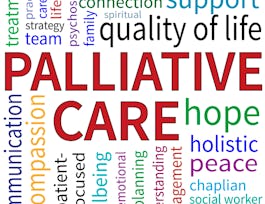This course should be taken after the Symptom Management course and continues building your primary palliative care skills – communication, psychosocial support, goals of care, and symptom management. You will explore transitions in care such as survivorship and hospice. You will learn how to create a survivorship care plan and how to best support a patient. The course also covers spiritual care and will teach you how to screen for spiritual distress. Finally, you will learn the requirements for hospice care and practice discussions difficult conversations related to end-of-life care.


Transitions in Care from Survivorship to Hospice
This course is part of Palliative Care Always Specialization
Taught in English


Instructors: Kavitha Ramchandran
Course
(16 reviews)
Recommended experience
What you'll learn
Describe how a patient’s needs change as the prognosis changes
Identify the benefits of spiritual screening and assessment
Define survivorship and specific survivorship needs for patients
Define hospice care and how it differs from palliative care
Skills you'll gain
Details to know

Add to your LinkedIn profile
14 quizzes
Course
(16 reviews)
Recommended experience
See how employees at top companies are mastering in-demand skills

Build your subject-matter expertise
- Learn new concepts from industry experts
- Gain a foundational understanding of a subject or tool
- Develop job-relevant skills with hands-on projects
- Earn a shareable career certificate


Earn a career certificate
Add this credential to your LinkedIn profile, resume, or CV
Share it on social media and in your performance review

There are 6 modules in this course
Welcome to Transitions in Care from Survivorship to Hospice, the third course in the Palliative Care Always specialization. This course focuses on the major changes that occur during the care continuum and how these changes impact the patient. This module will provide you with information on the course structure and first steps.
What's included
3 readings2 quizzes
This module reviews the concepts learned in the Essentials of Palliative Care course and a brief summary of the symptoms covered in the Symptom Management in Palliative Care course. We realize that some learners are interested in only completing specific courses while others are moving through the entire specialization. Therefore the following videos are meant as a review for those who have not completed the other courses. You are not required to watch these videos if you feel you have a strong handle on the material. You can check your knowledge with the ungraded quiz in the next section and review the summary videos if necessary. Also contained in this module are the Sarah case study videos from Essentials of Palliative Care for those who want to review her story. Check your knowledge with the ungraded quiz in the next section and review the summary videos, if necessary. Also contained in this module are the Sarah case study videos from Essentials of Palliative Care and Symptom Management in Palliative Care for those who want to review her story.
What's included
11 videos2 readings1 quiz
Survivorship can be different depending on the type of serious illness the patient experiences. Patients define survivorship in a variety of ways – some define themselves as survivors when in remission, while other define survivorship as living each day fully while battling disease.Survivorship is most commonly discussed in the cancer setting as patients can be considered survivors during remission. In this module we will discuss survivorship in an oncology setting and a chronic disease setting such as liver disease.
What's included
3 videos6 readings3 quizzes1 discussion prompt1 plugin
Families experiencing a serious illness deal with pervasive physical, emotional, and spiritual distress. Spiritual concerns and emotional concerns are very much intertwined. Studies show that patients rely on spirituality to cope and find strength; positive religious coping is associated with improved comfort, increased self-esteem, and decreased anxiety. When people experience spiritual distress, the loss of this coping mechanism can compound negative effects of illness and increase suffering. Increasingly, spiritual care professionals such as chaplains work as part of healthcare teams to support the spiritual needs of families. Still, all members of the care team can gain the skills to identify and respond to spiritual distress. This module explores spirituality, spiritual distress, and how to leverage hope and forgiveness to bring comfort to patients and families.
What's included
4 videos8 readings4 quizzes1 discussion prompt1 plugin
Now we will take a look at death as a part of life. Palliative care, as we have learned throughout this course, is rooted in supporting optimal quality of life throughout the care continuum. While end-of-life is but one phase of this experience, hospice care is an invaluable tool to help patients and families live and die with dignity and comfort. During this module, you will learn more about identifying when a transition to hospice is warranted and tips for discussing the transition to hospice care. You will learn more about how the hospice team supports patients and families at end-of-life and experience a hospice home visit with Dr. Ellen Brown.
What's included
4 videos7 readings2 quizzes1 discussion prompt
Congratulations on completing the course content. You have a few more step to complete the course. First review your reflection, next complete a peer-reviewed course project and then take the final exam. We hope you have enjoyed the course and look forward to seeing you in other classes!
What's included
1 reading2 quizzes1 peer review
Instructors


Offered by
Recommended if you're interested in Patient Care

Stanford University

Coursera Project Network

Stanford University

Tecnológico de Monterrey
Why people choose Coursera for their career




New to Patient Care? Start here.

Open new doors with Coursera Plus
Unlimited access to 7,000+ world-class courses, hands-on projects, and job-ready certificate programs - all included in your subscription
Advance your career with an online degree
Earn a degree from world-class universities - 100% online
Join over 3,400 global companies that choose Coursera for Business
Upskill your employees to excel in the digital economy
Frequently asked questions
Dates and Duration Original Release Date: 09/30/2023 Expiration Date: 09/29/2026 Estimated Time to Complete: 10 hours Accreditation In support of improving patient care, Stanford Medicine is jointly accredited by the Accreditation Council for Continuing Medical Education (ACCME), the Accreditation Council for Pharmacy Education (ACPE), and the American Nurses Credentialing Center (ANCC), to provide continuing education for the healthcare team. Credit Designation American Medical Association (AMA) Stanford Medicine designates this enduring material for a maximum of 10.0 AMA PRA Category 1 CreditsTM. Physicians should claim only the credit commensurate with the extent of their participation in the activity. American Nurses Credentialing Center (ANCC) Stanford Medicine designates this enduring material activity for a maximum of 10.0 ANCC contact hours. ASWB Approved Continuing Education Credit (ACE) – Social Work Credit As a Jointly Accredited Organization, Stanford Medicine is approved to offer social work continuing education by the Association of Social Work Boards (ASWB) Approved Continuing Education (ACE) program. Organizations, not individual courses, are approved under this program. State and provincial regulatory boards have the final authority to determine whether an individual course may be accepted for continuing education credit. Stanford Medicine maintains responsibility for this course. Social workers completing this activity receive 10.0 enduring material continuing education credits. American Academy of Physician Assistants (AAPA) - Enduring Material Stanford Medicine has been authorized by the American Academy of PAs (AAPA) to award AAPA Category 1 CME credit for activities planned in accordance with AAPA CME Criteria. This enduring activity is designated for 10.0 AAPA Category 1 CME credits. Approval is valid until 09/29/26. PAs should only claim credit commensurate with the extent of their participation. Disclosures Stanford Medicine adheres to the Standards for Integrity and Independence in Accredited Continuing Education. There are no relevant financial relationships with ACCME-defined ineligible companies for anyone who was in control of the content of this activity.
View more at https://stanford.cloud-cme.com/course/courseoverview?P=0&EID=47066
Access to lectures and assignments depends on your type of enrollment. If you take a course in audit mode, you will be able to see most course materials for free. To access graded assignments and to earn a Certificate, you will need to purchase the Certificate experience, during or after your audit. If you don't see the audit option:
The course may not offer an audit option. You can try a Free Trial instead, or apply for Financial Aid.
The course may offer 'Full Course, No Certificate' instead. This option lets you see all course materials, submit required assessments, and get a final grade. This also means that you will not be able to purchase a Certificate experience.
When you enroll in the course, you get access to all of the courses in the Specialization, and you earn a certificate when you complete the work. Your electronic Certificate will be added to your Accomplishments page - from there, you can print your Certificate or add it to your LinkedIn profile. If you only want to read and view the course content, you can audit the course for free.

